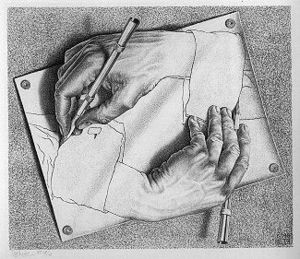The greatest gift you can offer anyone is your undivided attention.
— gnox
Author: gnox
Nature’s imagination
Life imitates art. We shape our tools and thereafter they shape us.
— John M. Culkin, “A Schoolman’s Guide to Marshall McLuhan” (Saturday Review, 1967)
Every time we introduce a new tool, it always leads to new and unexpected discoveries, because Nature’s imagination is richer than ours.
— Freeman Dyson, ‘The Scientist as Rebel’, in Cornwell (ed.), Nature’s Imagination
The process of natural design, it seems, will routinely outrun the imaginings of human theorists.
— Andy Clark (1997, 97)
Do you mind?
As the sole Reader of the Book, you are entrusted with its meaning. Just so, according to Rumi, Adam was entrusted with the naming of all beings, and humanity was entrusted with all creation.
You are an ocean of knowledge hidden in a dew drop, a world concealed in [a few feet] of body.… So man is in form a branch of the world, but in attribute the world’s foundation.… Whatever appears within him is His reflection, like the moon in a stream.… The Prophet said, ‘He who knows himself knows his Lord.’
— Rumi (Chittick 1983, 64-5)
Enough already
Creation is always also destructive – especially if we suppose that the universe is created out of nothing. Talk about disturbing the peace!
And why not let matters rest there? For this way of talking surely says everything we want to say, and everything that can be said. But we wish to say that it can also be put differently; and that is important.
— Wittgenstein (1930, 84)
Peirce on imagination
When a man desires ardently to know the truth, his first effort will be to imagine what that truth can be. He cannot prosecute his pursuit long without finding that imagination unbridled is sure to carry him off the track. Yet nevertheless, it remains true that there is, after all, nothing but imagination that can ever supply him an inkling of the truth. He can stare stupidly at phenomena; but in the absence of imagination they will not connect themselves together in any rational way.
— Peirce (CP 1.46, c. 1896)
Whooth?
In the buginning is the woid, in the muddle is the sounddance and thereinofter you’re in the unbewised again, vund vulsyvolsy.
— Finnegans Wake, 378
Understanding understanding
I never understand anything until I have written about it.
— Horace Walpole

How Forests Think
Toties testies quoties questies. The war is in words and the wood is the world. Maply me, willowy we, hickory he and yew yourselves. Continue reading How Forests Think
Wild science
A pretty wild play of the imagination is, it cannot be doubted, an inevitable and probably even a useful prelude to science proper.
— Peirce, CP 1.235 (1902)
The Life of Jesus
No Evangelist has the slightest interest in writing a biography of Jesus. The Jesus about whom a biography can be written is dead and gone, and survives only as Antichrist. The Evangelists tell us not how Christ came, but how he comes: they are concerned not with a vanished past but with the imagination’s ‘Eternal Now.’ The timid will protest that we are here in danger of dissolving the reality of Christianity into a vaporous allegory; Blake’s answer is that the core of reality is mental and present, not physical and past. Past events do not necessarily dissolve in time, but their existence in the eternal present depends on imaginative recreation.
— Northrop Frye (1947, 343)